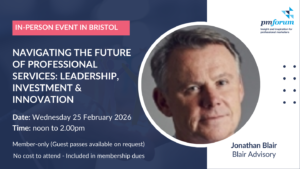Welcome to PM Forum South West
The South West regional events take place either in Bristol and Exeter city centres at various venues. Organised by a local committee of professional services marketers, events aim to bring together those responsible for the marketing and business development function at law, accountancy, property, consultancy and other professional sectors.
Meet the committee

Matt Evans
Regional Chair
TLT

Anna Lake
Regional Director
Client Talk

Kirsty Daniel
Simmons & Simmons

Ross Jones
Milsted Langdon

Charlotte Keen
Irwin Mitchell

Lizzy Norman
Osborne Clarke
Upcoming events
10 Victoria Street, Redcliffe, Bristol BS1 6BNNavigating the future of professional services: leadership, investment and innovation
Previous events
November 2025
Hybrid, Human, High‑Impact: Rethinking Client Events in 2026
October 2025
June 2025
May 2025
How to turn strategic thinking into marketing success (without blowing your budget)
January 2025
October 2024
September 2024
June 2024
Client demands, innovation and evolving expectations for Marketing & BD teams
February 2024
November 2023
How to thrive in 2024: The key priorities and challenges for BD & Marketing teams
Why attend a PM Forum event?
Cross-sector attendees
With marketing professionals across accountancy, law, property, and more, no matter the topic, there will always be an opportunity to learn and network with a wide variety of your peers.
Educational events
Stay up-to-date on topics key to your role and development from the best experts, consultants and in-house professionals. In-person to facilitate networking plus online to enable a learning environment with no geographic boundary.
Cost effective
Events are included in the corporate membership bundle, allowing easy and great value access at no additional cost.

Years Established
LinkedIn Followers
%
Members for Over 10 Years
%
Members Over 5 Years
Previous events & reports
How to use language to build trust and win work
Thursday 23 March 2023, Bristol
The event provided lots of practical tools and techniques for members to lift their communications to a new level from the minute they left the session (or finish a lunchtime sarnie).
We covered:
- Your mindset to writing and how simply by flipping it you will become more effective
- How to make your content and structure more compelling
- How to use your tone of voice to stand out and get heard
How to build profitable relationships in a chaotic world
Tuesday 15 November 2022, Bristol
Peter Kane shared what is working for smart firms now, so that you come out of 2023 with an even stronger profile and flow of profitable work than before.
What was covered:
- The winter to diss content – why results rely on moving from keyboard warrior to heads-up delivery
- Room vs Zoom – How to focus time in a world that’s rediscovered it’s love of contact
- The energy crisis in the professions – how to squash lethargy and reheat your pipeline
- What BD is back to full speed and what has irreversibly changed post-covid
- The new battleground of communicating values to clients and colleagues
- 12 ways to win time with even the busiest decision-makers
- What we can learn from the smartest firms in law, finance and consulting
Members can watch the full webinar here
Summer drinks: The future for marketing and business development in the South West
Tuesday 05 July 2022, Bristol
PM Forum South West was back with a bang at Burges Salmon’s waterside office in Bristol this July. This face-to-face event was long awaited as we’d endured a two-year hiatus, thanks to the coronavirus pandemic.
So, during a warm summer’s evening, 50 professional services marketers and BDs gathered to hear insights from a panel of three marketing leaders. The theme was the future for marketing and business development in the south west.
On the panel were Louise Edwards, marketing director at Michelmores; Amelia Stirling, chief markets officer at Burges Salmon; and Paul Seymour, marketing director at Bishop Fleming.
After some initial networking, everyone sat down and host Matt Evans of Burges Salmon kicked off proceedings by asking: what’s keeping the panel awake at night?
What’s keeping you awake at night?
Paul put a positive spin on his response, describing one of his biggest challenges being trying to imagine the marketing team he needs for the future to help deliver Bishop Fleming’s ambitious growth targets:
“Covid changed the dynamics of the team. There were no events to put on, no networking – we needed to go more digital, and fast. One positive from this is our webinar capability which we developed during the pandemic. It is definitely here to stay.
“I am asking questions like: what do I want my marketers of the future to be? T-shape or specialists? Outsourced or in-house?”
Amelia added that she was experiencing similar challenges at Burges Salmon. She went on to discuss the issues posed by the economic headwinds: “Do we have a strong pipeline? Can we deliver counter-cyclical services?”
Matt then moved us on to the next question.
How have expectations of you as a leader changed since the pandemic?
Emphasising the shift first to virtual and then to hybrid, Amelia observed: “The pandemic forced us, as leaders, to concentrate more on the mental health of our teams and that is sure to continue.
“Then there are issues around ‘How do we meet/communicate in a hybrid world?’… ‘Is the team ready to pivot again should the need arise?’.
“It was relatively easy to engage with partners during the pandemic, but we need to keep this going as we move on.”
How are you managing hybrid?
Louise shared her thoughts and experiences on this big issue of our time: “Becoming a flexible workforce was obviously a challenge in itself, and now the challenge moves on to ‘How do we bring people back in an intentional, action-led way, rather than being prescriptive?’
“We have an agile working pilot running at the moment. We do not tell people how many days they need to be in the office – it is their choice. We have guiding principles around what works best for our clients, our people and the business. Because there is no road map for this there are times when it can be challenging, but we are making real progress, and our people love the trust that we place in them.
“This is working well within marketing, and we have anchor days, but cohesion with the wider firm is harder. We are trying to address this with socials, and offering free food to encourage people to come in on certain days.”
Paul was in broad agreement: “It is the same at Bishop Fleming, we are not prescriptive, but have guiding principles – for instance, junior staff need to come into the office more because they need greater supervision and support in their early career.
“There is a real value in bringing people together, but I think we are now more conscious of burnout. I tell my team to work smartly – sync diaries etc. And we encourage socials.”
At this point, Matt pitched a new question.
How have the advisory expectations of your team been changed by the pandemic?
Paul was first to answer: “My team have really been able to show their value: Getting information out quickly, helping people network on LinkedIn. The more value we have added, the more people come to us. We actually try to drop the general ‘marketing’ label and be a team of specialist go-to people.”
This prompted the next question.
How has marketing changed?
Louise described some of the change she and her team have experienced: “For the pre-pandemic staple of in-person events, it is now far harder to ensure attendance. We still do webinars. We tried hybrid events, but found that it doubled effort and diminished returns.
“So now an in-person event has to be really justified for it to be signed off. This is leading to more client-led events. It is challenging, but we are making progress.”
Paul continued: “I’d agree: hybrid events don’t work and we can’t rely on the attendance figures we may have enjoyed pre-pandemic. Working from home has negatively impacted event activity in that respect. Instead we are thinking about the experience that we can offer.
“Last week we took ten clients walking llamas up on the moors – A bizarre idea but we had fantastic feedback… quality time spent with clients, out of the office, promoting health and well-being – a memorable experience.”
The discussion gave rise to a question from the audience.
Will the next generation of clients even care about in-person events? Will it be all digital?
Paul responded: “From a business development perspective, selfishly if you will, face-to-face always works best. Get our people in front of prospects and we will win clients, but we need to work harder to persuade people to meet.”
A member of the audience volunteered that peer-to-peer learning is a great hook.
Amelia added: “While younger generations need less face-to-face, it is still important when making decisions to instruct.”
How have client expectations changed?
Amelia fielded this question: “Professional services got closer to their clients during the pandemic. No one had all the answers and there was the feeling that we were all in it together. This led to added humility.
“I think there is an expectation from clients that this will continue, that we will be more responsive. But it is harder to fulfil as partners and staff are back out in the world.”
The discussion moved on to talent retention.
What are your thoughts on future work practices, like the four-day working week?
Amelia said: “I have worked a four-day week since my third child, although I am still available on my day off. I think it is great for well-being, but there is an onus on both parties to make it work.”
Louise commented: “We are accommodating, but the needs of the business must also be met. Boundaries can be hard to set: it can be complex.”
Paul shared his thoughts, too: “We encourage flexible working as well. I am very interested in the concept of 80% work, 100% productivity. There are some radical ideas out there.
“We’ve just gone through an employer branding project and found that there is real demand for challenging, interesting work (as a priority over salary etc.).”
A member of the audience asked the next question.
Are you pursuing new channels like TikTok?
“I think it depends on what audience you are trying to engage,” was Amelia’s first thought, “For example, Instagram for employer branding. There is an audience there on TikTok, but we haven’t explored it yet.” She put the question back to the floor…
An employee from one large law firm said they had discussed it, but that no decision had been made.
Paul said: “We have done research and found no major peer group firms embracing TikTok. But we are mindful that many employers, such as the British Army, are using these new channels to reach out to younger people.
“Recently, we hosted a young work experience placement in our team who gave us some interesting insights into emerging social media platforms.”
What will you do to justify marketing budget in a recession?
Amelia was forthcoming on this: “I think recessions are a good opportunity to shed poor value initiatives. That said, I will always link marketing budget to revenue growth and use data to justify the business case.”
Is the way you compete geographically changing?
Amelia pointed out that the pandemic helped shift the need for proximity for clients and thought that this would continue. Louise focused on the recruitment market in her answer: “The talent piece around geography has become more interesting, with salaries based on regions, not more specific office locations.”
Paul concluded: “Much work can be done remotely, including remote audit, but there is still value in meeting people face-to-face.”
The discussion was drawing to a close, but there was time for one curveball from the audience…
Have you explored the metaverse?
None of the panel was in a position to answer this in depth and a member of the audience suggested that it may be a question for a future generation.
Paul observed: “With all such trends, it’s important to weigh up first mover advantage against watching someone go first. Either way we have to be in tune with the trends. As marketers, we need to question marketing inertia and whether things should be done differently. It is something that is probably not done enough.”
That was it and the panel were thanked with a round of applause. Drinks were served, over which the attendees enjoyed some more networking within the Bristol professional marketers community. Now we look forward to our next gathering in Bristol, details of which will be announced shortly. Why not sign up to our mailing list to receive your invite?
And before we sign-off, don’t forget that the PM Forum Annual Conference is nearly upon us, which is themed: Staying ahead of the curve – Delivering marketing impact and digital transformation. It begins on 29 September and promises to be full of useful insight. You can find out how to attend here.
Huw Bendon, On Point Copywriting
Becoming a thought leader: what’s holding you back?
Tuesday 28 June 2022, Exeter
In this 3 minute taster Professor Will Harvey of the University of Bristol, and Kevin Hunter, Marketing Manager at BDO, discussed just what thought leadership is in the first place, and how firms can approach the challenge of becoming thought leaders.
Will will talk about how firms can use thought leadership to gain reputation advantage, and will lay out a framework for understanding how you can approach thought leadership production in your firm while navigating with the tensions that can arise along the way – from engaging partners to evaluating ROI.
PM Forum members can view the full video here
Clarity is the key to success in your client engagement programme
Thursday 09 June 2022, Bristol
In this webinar, Darren Francis will cover:
- How to achieve clarity in your key client management programmes;
- How this clarity ensures that your clients are engaged and willing to work with you over long periods to develop new ideas and services;
- Preparing for key client meetings and generating stand-out conversations;
- Practical tips and guidance for getting winning key client management programmes off the ground.
PM Forum members can log in to watch the full video
The view from the top – the real driver behind the ‘E’ in your ESG agenda
Tuesday 17 May 2022, Exeter
Jim McNeill, an accomplished polar explorer and climate change ambassador discussed the threat facing our planet, and what we as individuals and firms can do to mitigate our impact.
Supercharge your website
Wednesday 04 May 2022, Bristol
Ryan Webb talked through some of the critical elements of a high performing website and provide you with some tips on what you can do to encourage more visitors to enquire. He did not tell you to rebuild your website, but rather look at it from a different perspective and find opportunities for significant improvement.

